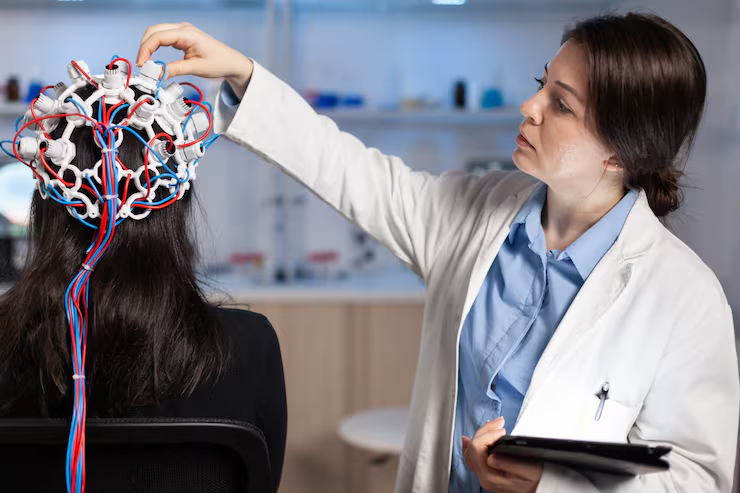Post-Traumatic Stress Disorder (PTSD) is a mental health condition that can develop after experiencing or witnessing traumatic events. People living with PTSD often experience intrusive memories, flashbacks, anxiety, sleep problems, and difficulty functioning in daily life. While traditional therapies such as medication and talk-based counselling are often helpful, not every patient responds to these methods. This is where TMS treatment for PTSD has emerged as an alternative option.
In recent years, researchers and clinicians have studied how TMS in Melbourne and worldwide clinics may help patients who have not found relief through conventional treatments. This article looks at what the research says about the effectiveness of TMS for PTSD, how it works, and what patients should expect.
Understanding TMS

What is TMS?
Transcranial Magnetic Stimulation (TMS) is a non-invasive treatment that uses magnetic fields to stimulate nerve cells in specific areas of the brain linked to mood regulation and emotional processing.
How It Works
During a session, an electromagnetic coil is placed on the scalp. This coil delivers magnetic pulses that activate parts of the brain that may be underactive in people with mental health conditions. Unlike medications, TMS does not involve systemic side effects, and unlike electroconvulsive therapy, it does not require anaesthesia.
PTSD and Brain Function
Research shows that PTSD is associated with changes in how the brain processes fear and memory. Areas such as the prefrontal cortex and amygdala are often involved. The prefrontal cortex, responsible for rational thinking, may be underactive, while the amygdala, responsible for fear responses, may be overactive.
By stimulating the prefrontal cortex, TMS may help restore balance in brain activity, reducing symptoms such as intrusive memories and hyperarousal.
What Research Says About TMS for PTSD
Clinical Trials and Studies
Several clinical trials have shown promising results for TMS in PTSD treatment:
- A study published in Biological Psychiatry found that repetitive TMS significantly reduced PTSD symptoms in veterans who had not responded to other therapies.
- Another trial reported improvements in both PTSD and depression symptoms, suggesting TMS could address overlapping conditions.
- Long-term follow-up research indicates that benefits can last several months, with some patients maintaining improvement up to a year.
Comparative Effectiveness
Compared with standard treatments such as medication, TMS provides an alternative for patients who either experience side effects from drugs or fail to achieve adequate relief. Some research also suggests that combining TMS with psychotherapy may enhance outcomes, as patients may be more receptive to therapy when symptoms are reduced.
Limitations of Research
While findings are encouraging, researchers highlight that larger studies are needed. Different protocols, including session frequency and stimulation intensity, may influence results. Not every patient responds the same way, but TMS has shown effectiveness for a significant portion of participants.
Benefits of TMS Treatment for PTSD
Non-Invasive
TMS does not involve surgery, needles, or medication. Patients remain awake during sessions, which typically last 20 to 40 minutes.
Few Side Effects
The most common side effects are mild scalp discomfort or headache during treatment, which usually lessen after the first few sessions. Unlike medications, TMS does not cause weight gain, fatigue, or sexual side effects.
Suitability for Treatment-Resistant PTSD
For individuals who have tried multiple medications or therapies without success, TMS offers a new option that works through a different mechanism.
Improves Co-Existing Conditions
Many people with PTSD also experience depression or anxiety. Research shows that TMS may reduce symptoms of these conditions as well, improving overall quality of life.
What to Expect During TMS in Melbourne
Patients seeking TMS in Melbourne can expect a structured treatment plan.
Initial Consultation

A specialist will assess medical history, current symptoms, and past treatments to confirm whether TMS is suitable.
Treatment Sessions
- The patient sits comfortably while a magnetic coil is positioned over the head.
- Each session lasts around 20 to 40 minutes.
- Treatment is typically administered five days a week for four to six weeks.
Recovery
There is no downtime after sessions. Patients can drive home and return to normal activities immediately.
Long-Term Outlook
TMS is not a cure for PTSD, but research suggests it can significantly reduce symptoms, improving day-to-day functioning. Some patients may need follow-up sessions, known as maintenance TMS, to preserve results.
The combination of TMS with psychotherapy, lifestyle changes, and ongoing support often produces the best outcomes. Patients who maintain healthy routines, including exercise, sleep, and stress management, tend to benefit most from treatment.
Considerations Before Starting
Who is Eligible?
TMS is typically recommended for adults with PTSD who have not found success with standard therapies. However, patients with certain medical conditions, such as a history of seizures or metal implants in the skull, may not be eligible.
Cost and Accessibility
The cost of TMS can vary depending on the number of sessions and clinic location. While not always covered by insurance, some providers offer flexible payment options. Clinics offering TMS in Melbourne may also provide guidance on financial considerations.
Choosing a Qualified Clinic
Selecting an experienced provider ensures safety and increases the likelihood of successful outcomes. Patients should look for clinics with trained specialists who follow established treatment protocols.
Final Thoughts
The growing body of research shows that TMS treatment for PTSD is a promising option, especially for individuals who have not benefited from medication or traditional therapy. By directly targeting brain areas involved in fear and memory, TMS may help reduce symptoms and restore quality of life.
For those exploring options in Australia, TMS in Melbourne is becoming more widely available, offering access to evidence-based treatment in a professional setting. While more studies are needed to refine protocols and understand long-term results, current findings suggest that TMS is an effective and safe addition to the treatment options for PTSD.

